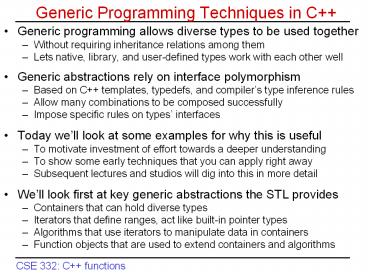Generic Programming Techniques in C - PowerPoint PPT Presentation
Title:
Generic Programming Techniques in C
Description:
Generic programming allows diverse types to be used together Without requiring inheritance relations among them ... Generic Programming Techniques in C++ – PowerPoint PPT presentation
Number of Views:100
Avg rating:3.0/5.0
Title: Generic Programming Techniques in C
1
Generic Programming Techniques in C
- Generic programming allows diverse types to be
used together - Without requiring inheritance relations among
them - Lets native, library, and user-defined types work
with each other well - Generic abstractions rely on interface
polymorphism - Based on C templates, typedefs, and compilers
type inference rules - Allow many combinations to be composed
successfully - Impose specific rules on types interfaces
- Today well look at some examples for why this is
useful - To motivate investment of effort towards a deeper
understanding - To show some early techniques that you can apply
right away - Subsequent lectures and studios will dig into
this in more detail - Well look first at key generic abstractions the
STL provides - Containers that can hold diverse types
- Iterators that define ranges, act like built-in
pointer types - Algorithms that use iterators to manipulate data
in containers - Function objects that are used to extend
containers and algorithms
2
STL Containers Can Hold Different Types
- include ltvectorgt
- include ltiostreamgt
- using namespace std
- int main (int, char )
- vectorltchar gt cstrings
- vectorltintgt numbers
- cstrings.push_back(one)
- cstrings.push_back(two)
- numbers.push_back(1)
- numbers.push_back(2)
- cout ltlt cstrings0 ltlt endl ltlt cstrings1 ltlt
endl - ltlt numbers0 ltlt endl ltlt numbers1 ltlt
endl - return 0 // what output is produced, and why?
3
STL Iterators Can Act Like Pointers (Somewhat)
- include ltvectorgt
- include ltiostreamgt
- using namespace std
- int main (int, char )
- vectorltchar gt cstrings
- vectorltintgt numbers
- cstrings.push_back(one) cstrings.push_back(t
wo) - numbers.push_back(1) numbers.push_back(2)
- vectorltchar gtiterator cstrings_iter
- cstrings.begin()
- vectorltintgtiterator numbers_iter
numbers.begin()
- cout ltlt cstrings_iter ltlt endl
- cstrings_iter
- cout ltlt cstrings_iter ltlt endl
- cout ltlt numbers_iter ltlt endl
- numbers_iter
- cout ltlt numbers_iter ltlt endl
- return 0 // what output is produced, and why?
4
STL Algorithms Use Iterators to Manipulate Data
- include ltvectorgt
- include ltiostreamgt
- include ltalgorithmgt
- include ltiteratorgt
- using namespace std
- int main (int, char )
- vectorltchar gt cstrings
- vectorltintgt numbers
- cstrings.push_back(one)
- cstrings.push_back(two)
- numbers.push_back(1)
- numbers.push_back(2)
- copy (cstrings.begin(), cstrings.end(),
- ostream_iteratorltchar gt(cout, \n))
- copy (numbers.begin(), numbers.end(),
- ostream_iteratorltintgt(cout, \n))
- return 0 // what output is produced, and why?
5
STL Functors Extend Algorithms ( Containers)
- include ltvectorgt
- include ltiostreamgt
- include ltalgorithmgt
- include ltiteratorgt
- using namespace std
- int main (int, char )
- vectorltchar gt cstrings
- cstrings.push_back(one)
- cstrings.push_back(two)
- sort (cstrings.begin(), cstrings.end(),
- greaterltchar gt())
- copy (cstrings.begin(), cstrings.end(),
- ostream_iteratorltchar gt(cout, \n))
- return 0 // what output is produced, and why?































